
Royal Dental Care Clinic Top Tips for Maintaining Oral Hygiene at Home
Dental Care Clinic Maintaining oral hygiene at home is essential for overall health and well-being. Good oral hygiene practices not only help prevent cavities and gum disease but also contribute to better overall health. Here are some top tips to help you maintain excellent oral hygiene at home.
1. Brush Your Teeth Twice a Day
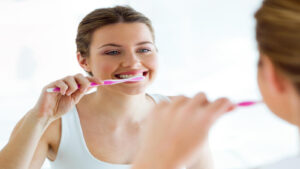
Brushing your teeth twice a day is the cornerstone of good oral hygiene. Use a soft-bristled toothbrush and fluoride toothpaste to brush your teeth for at least two minutes. Make sure to brush all surfaces of your teeth, including the fronts, backs, and chewing surfaces. Brushing before bedtime is crucial as it removes the day’s buildup of plaque and bacteria.
2. Use the Right Brushing Technique
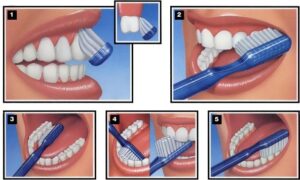
the dental care clinic is suggested Using the correct brushing technique is as important as brushing regularly. Hold your toothbrush at a 45-degree angle to your gums and use gentle, circular motions. Avoid aggressive brushing, as it can damage your gums and tooth enamel. Pay attention to hard-to-reach areas and make sure you brush your tongue to remove bacteria and freshen your breath.
3. Floss Daily
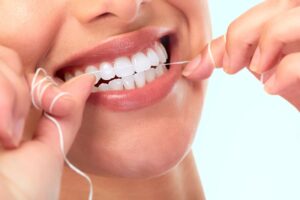
Flossing is essential for removing plaque and food particles from between your teeth and under the gumline, where your toothbrush can’t reach. Use about 18 inches of dental floss and wind it around your middle fingers, leaving a couple of inches to work with. Gently slide the floss between your teeth, using a clean section for each tooth. If traditional floss is challenging to use, consider floss picks or water flossers as alternatives.
4. Use Mouthwash

the dental care clinic is suggested Incorporating mouthwash into your daily routine can help reduce plaque, fight gum disease, and freshen your breath. Choose an antimicrobial or fluoride mouthwash and follow the instructions on the label. Swish the mouthwash around your mouth for 30 seconds to one minute, making sure to reach all areas. Avoid rinsing with water immediately after using mouthwash to allow the ingredients to work effectively.
5. Maintain a Healthy Diet
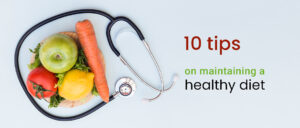
The dental care clinic is suggested Your diet plays a significant role in your oral health. Limit sugary and acidic foods and beverages, as they can erode tooth enamel and contribute to cavities. Instead, focus on a balanced diet rich in fruits, vegetables, lean proteins, and dairy products. Foods high in calcium, such as milk, cheese, and yogurt, help strengthen your teeth. Drinking plenty of water throughout the day also helps wash away food particles and bacteria.
6. Avoid Tobacco Products

the dental care clinic is suggested Smoking and using other tobacco products can lead to severe oral health problems, including gum disease, tooth decay, and oral cancer. Tobacco use also causes bad breath and stains your teeth. Quitting tobacco is one of the best things you can do for your oral and overall health. Seek support from healthcare professionals, friends, or support groups to help you quit.
7. Replace Your Toothbrush Regularly
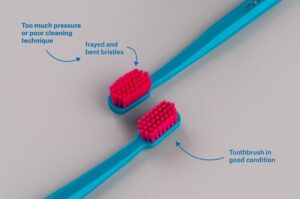
the dental care clinic is suggested Over time, toothbrush bristles become frayed and less effective at cleaning your teeth. Replace your toothbrush or toothbrush head (if using an electric toothbrush) every three to four months or sooner if the bristles are worn out. After being sick, it’s also a good idea to replace your toothbrush to avoid reintroducing bacteria into your mouth.
8. Protect Your Teeth
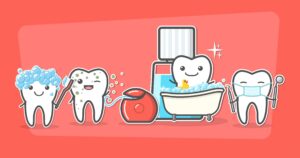
The roayl dental care clinic is suggested If you participate in contact sports or grind your teeth at night, wearing a mouthguard can help protect your teeth from damage. Mouthguards are available over-the-counter or can be custom-made by your dentist. Custom-made mouthguards offer a better fit and more protection than store-bought options.
9. Visit Your Dentist Regularly
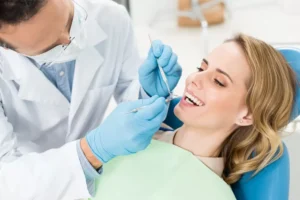
Regular dental checkups and cleanings are crucial for maintaining oral health. Your dentist can detect early signs of dental problems, provide professional cleanings, and offer personalized advice on oral hygiene. Aim to visit your dentist at least twice a year or as recommended based on your individual needs.
10. Stay Hydrated
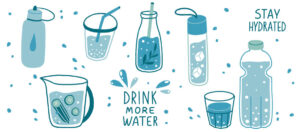
Drinking water throughout the day helps keep your mouth moist and washes away food particles and bacteria. Staying hydrated also stimulates saliva production, which is essential for neutralizing acids and protecting your teeth from decay. Make water your go-to beverage, especially after meals and snacks.
11. Use Dental Products Containing Fluoride
Fluoride is a mineral that helps strengthen tooth enamel and prevent cavities. Use toothpaste and mouthwash that contain fluoride, and ask your dentist about fluoride treatments if you’re at higher risk for tooth decay. Fluoride is especially important for children, as it helps in the development of strong, healthy teeth.
12. Chew Sugar-Free Gum
Chewing sugar-free gum after meals can help increase saliva flow, which aids in washing away food particles and neutralizing acids. Look for gum containing xylitol, a natural sweetener that has been shown to reduce the risk of cavities. Avoid gum with sugar, as it can contribute to tooth decay.
13. Be Mindful of Your Oral Health
the dental care clinic is suggested Pay attention to any changes in your oral health, such as bleeding gums, persistent bad breath, or tooth sensitivity. These could be signs of underlying dental problems that require attention. Don’t hesitate to contact your dentist if you notice any unusual symptoms or have concerns about your oral health.
the dental care clinic is suggested Maintaining good oral hygiene at home requires consistent effort and attention to detail. By following these tips, you can keep your teeth and gums healthy, prevent dental problems, and enjoy a bright, confident smile. Remember, your oral health is an essential part of your overall well-being, so make it a priority every day.

